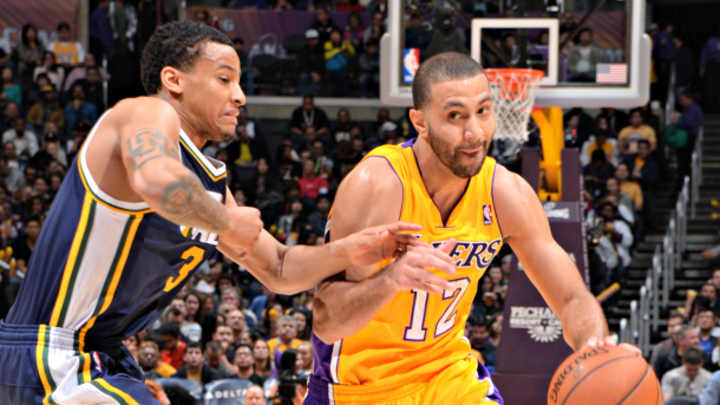Kendall Marshall rattles off career bests vs. Jazz in first start as a Laker

Kendall Marshall (right) was a handful off the dribble on Friday. (Andrew D. Bernstein/NBAE via Getty Images)
Just prior to the 2013-14 season, two NBA teams decided that they had no use for Kendall Marshall. The 22-year-old point guard was first traded by the Suns, included as filler to complete the exchange of Marcin Gortat for Washington's Emeka Okafor. Subsequently, the Wizards agreed to pay Marshall his full $2 million salary while sending him home; Marshall was waived just days after being acquired, and went unclaimed through the waiver process.
He remained unsigned for a few months further, until the Lakers' suffered injury upon injuries. The entirety of L.A.'s point guard rotation went down in a heap of muscle, tendon and nerve damage before Marshall's phone rang, but eventually it did. Some two weeks later he became the starter by default, and in the performance of his pro career posted personal bests in points (20), assists (15), and rebounds (six) while propelling the Lakers to a 110-99 win over the Jazz.
It was a declaration of purpose for a much-improved prospect. To some extent, the criticisms of Marshall's game had been deserved. Marshall was, as of last season, all of what he was accused -- a shaky shooter, a lacking defender and an unremarkable athlete by NBA standards. What's odd is that two teams would give up on him (and his rookie-scale contract) so quickly, and that more still would hesitate to either claim Marshall off waivers or sign him on minimum terms. It was the Lakers who ultimately swooped in to collect, and on Friday they saw a refreshed version of Marshall fueling their offense. After just a few weeks in Los Angeles, he's already developed a playmaking shorthand with Pau Gasol, and learned how to navigate the basic actions of Mike D'Antoni's offense.
Marshall remains a pass-first player, but has clearly worked on expanding his shooting range and attacking off the dribble -- both of which expand his NBA utility greatly. Just watch the way he looked to turn the corner in the pick-and-roll on Friday:
These simply aren't moves that Marshall would have made a year ago, when he appeared tentative and out of his element in limited minutes for the Suns. It certainly helped that Utah surrendered driving angles readily and never really tested the consistency of Marshall's jumper, but credit him for making the most of the opportunities presented. The Jazz ceded lanes on the drive, and Marshall took every inch he could. He looked natural making basic feeds to pick-and-roll finishers, and beyond that showed a knack for making the next-level pass to the weak-side corner:
There's no progression in those clips so much as snap observation. Marshall makes a decisive play when other pick-and-roll operators might still be cycling through their options; he reads the floor beautifully, and in these cases was able to make skip passes from various points on the floor to set up knockdown shooters in a moment of defensive inattention. Those slips came more often with Utah -- which ranks as the worst defensive team in the league -- than they will against other opponents, but what matters most is that Marshall is equipped to capitalize when those moments arise. Thus far he seems up to the task, as he gradually waded his way into a read-and-react role to guide the wayward Lakers offense. It suits him.
Marshall's numbers will come back to earth, if only because -- much to the chagrin of players across the league -- not every game can be played against the Jazz. He'll be challenged a bit more by opponents who go under his screens, seeing that he needs the separation a pick provides to really make a move toward the rim. He'll be reined in by more consistent help defense, an element of the game that thus far eludes Utah. Marshall will be attacked, too, by far more prolific guards, who will make him pay for his own defensive lapses in a way that just didn't happen on Friday night. His performance will equalize a bit, albeit to a degree that reflects his newfound basketball reality.
That reality is guided by a simple underlying principle: That this is not the same player who was twice waived and for weeks unwanted. He's grown -- as a creator and as a shooter, thus far to great effect. It may have been the Lakers' desperation that gave Marshall this latest shot, but it's through his steadily expanding game that he's earned his new NBA lease.

Rob Mahoney is an NBA writer dedicated to the minutiae of the game of basketball, its overarching themes and everything in between. He joined the Sports Illustrated staff in 2012.